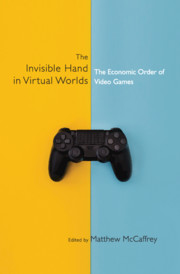Book contents
- Frontmatter
- Contents
- Introduction
- 1 The Economic Meaning of Play: Ludology and Praxeology in Video Game Worlds
- 2 Spontaneous Order and Video Game Narrative
- 3 Law and Economics in a World of Dragons
- 4 Minerals, Titans, and Connections: The Political Economy of Empire in the World of EVE Online
- 5 The Origins of Money in Diablo II
- 6 A Virtual Weimar: Hyperinflation in Diablo III
- 7 The Facilitate or Acquire Decision: The Tipping Points for Strategies toward User-Generated Content in Massively Multiplayer Online Game Platforms
- 8 Mod the World: How Entrepreneurs Learn from Video Game “Modding” Communities
- 9 Levels without Bosses? Entrepreneurship and Valve's Organizational Design
- About the Contributors
- Index
4 - Minerals, Titans, and Connections: The Political Economy of Empire in the World of EVE Online
Published online by Cambridge University Press: 31 July 2021
- Frontmatter
- Contents
- Introduction
- 1 The Economic Meaning of Play: Ludology and Praxeology in Video Game Worlds
- 2 Spontaneous Order and Video Game Narrative
- 3 Law and Economics in a World of Dragons
- 4 Minerals, Titans, and Connections: The Political Economy of Empire in the World of EVE Online
- 5 The Origins of Money in Diablo II
- 6 A Virtual Weimar: Hyperinflation in Diablo III
- 7 The Facilitate or Acquire Decision: The Tipping Points for Strategies toward User-Generated Content in Massively Multiplayer Online Game Platforms
- 8 Mod the World: How Entrepreneurs Learn from Video Game “Modding” Communities
- 9 Levels without Bosses? Entrepreneurship and Valve's Organizational Design
- About the Contributors
- Index
Summary
The online game EVE Online is of interest to scholars from a wide range of academic disciplines in addition to those concerned with the specific topic of video games as such. That is because the nature of the game and its setup, together with the deliberate policy of its creators, CCP Games, has brought about a complex and evolving emergent order. The phenomenon of emergent or spontaneous order is very important for several disciplines but in this case, the details of the order and the paths the evolution has taken are relevant for several important debates in a number of disciplines. In particular, EVE Online casts light on questions about the ability of rational choice to give a convincing account of the evolution of political orders, the value of Hobbesian state of nature models, and questions about the dynamics and stability or otherwise of interstate systems—to mention just three.
EVE Online is perhaps the best known and most widely discussed example of the genre of massively multiplayer online games (MMOGs) (Achterbosch, Pierce, and Simmons, 2008). This is despite its having far fewer subscribers and active players than some other MMOGs, such as World of Warcraft for example. EVE has appeared on major mainstream news outlets such as the BBC and has already become the topic of a scholarly literature (BBC, 2013; Carter, Bergstrom, and Woodford, 2016). Interest from mainstream media reflects distinctive features of the game, such as its single server and the lack of prohibitions against conduct that would be considered “grieving” and lead to barring in almost all other games (Evans, 2010). This results in spectacular scams and acts of betrayal and, most notably, massive armed conflicts in the virtual world of EVE, the best known of which destroyed capital assets worth $300,000 in real money (Moore, 2014). The scale of these events is what attracts the popular attention. The scholarly interest has two foci. One is the way in which the game is different from others in terms of its organization and the degree of control exerted by the designers as well as in other ways. It is thus an example of a different kind of online game to the normal or typical models. It is therefore of interest to those concerned with the internal logic, nature, and development of the genre of virtual worlds.
- Type
- Chapter
- Information
- The Invisible Hand in Virtual WorldsThe Economic Order of Video Games, pp. 71 - 104Publisher: Cambridge University PressPrint publication year: 2021

